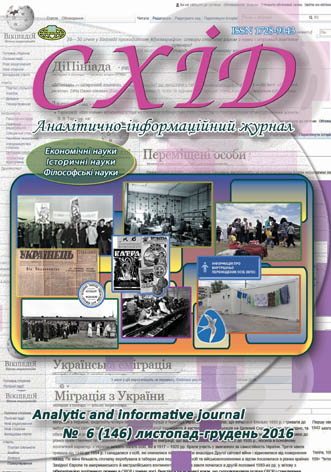National policy of Ukraine in culture in the evaluation intellectual elites and civil society experts (1999-2015)
DOI:
https://doi.org/10.21847/1728-9343.2016.6(146).91766Keywords:
Cultural policy, heritage, national memory, civil societyAbstract
Euromaidan and dignity revolution, which further continues, clearly show that without change in the national policy of culture change the country will be very difficult. It's tactics and strategy formation space of life for the citizens of Ukraine, information about Ukrainian and country in the world, formed throughout history and established in today's harmful and humiliating stereotypes, myths. Obviously the official state culture has long been not satisfied an active, creative part of society. Outside the official data analysis of cultural policy meet in publications, cultural in content, authored by writers, critics, scholars and public figures.
Balance cultural processes, that attitude to culture as an important tool strengthening state sovereignty on the political, spiritual, economic and other levels and other levels within Ukraine and abroad ensured civil society. They monitor cultural processes. Among the most notable, sharp and accurate assessments of cultural policy is advisable to allocate positions L. Kostenko, I. Dziuba, O. Zabuzhko, M. Riabchuk and other lesser-known experts. These persons is difficult to accuse of bias.
In the article was put goal disclose the relationship to the national cultural policy of the Ukrainian intelligentsia and civil society experts, that are recognized in Ukraine and the world.
Downloads
References
Kostenko, L. (2005), Humanitarian aura nation or defect of the primary mirror, Kyiv, 32 p. (ukr).
Dziuba, I. (2001),Ukrainebefore the Sphinx future, Kyiv, 35 p. (ukr).
Kostenko, L. (2005), Ukraine as a victim and a factor of globalization disasters, in Ivshynyia, L. (Ed.), Two Ruses, Ukrainian press-group, Kyiv, 496 p. (ukr).
Riabchuk, M. “In bed with an elephant” or colonial and postcolonial legacy inheritance, available at: http://gazeta.dt.ua/CULTURE/u_lizhku_zi_ slonom,_abo_kolonialna_spadschina_i_ postkolonialna_spadkovist.html (ukr).
Zabuzhko, O. (2005), On the verge of a humanitarian catastrophe cultural policy and state independence, Mirror of the week, 3 (December), № 47 (575) (ukr).
Rotovskyi, A., Shtepa, Yu. (2006), Ukrainian national idea: from weeping to a constructive dialogue. Why a national idea of Ukraine, Mirror of the week, 9 (September), № 34 (613) (ukr).
Okara, A. (2007), The cultural sovereignty of the nation in the period of post-modern or recode as «local» culture, Mirror of the week, 9 (September), № 34 (613) (ukr).
Zdioryk, O., Lytvynenko, O., Rozumna, O. (2012), Cultural Policy of Ukraine: national model in the European context, Kyiv, 69 p. (ukr).
Biletsky, V. (1997), NGOs and their role in society, Skhid, № 8, 16-20 (ukr).
Zabuzhko, O. (2015), Country without its history will not becomes a regional leader, available at: http://life.pravda.com.ua/culture/2015/12/12/204689/ (ukr).
Downloads
Published
How to Cite
Issue
Section
License
Copyright (c) 2017 Ivan Khoma

This work is licensed under a Creative Commons Attribution-NonCommercial-NoDerivatives 4.0 International License.
1. Authors bear responsibility for the accuracy of facts, quotations, numbers and names used.
2. Manuscripts are not sent back.
3. The publisher does not always agree with the authors' opinion.
4. The authors reserve the right to authorship of the work and pass the first publication right of this work to the journal under the terms of a Creative Commons Attribution-NonCommercial-NoDerivatives 4.0 International License. This license allows others to distribute (copy) the published work for non-commercial purposes, provided there is mandatory attribution to its authors and a link to the first publication in our journal.
5. The authors have the right to conclude separate supplement agreements that relate to non-exclusive work distribution in the form in which it has been published by the journal (for example, to upload the work to the online storage of the journal or publish it as part of a monograph), provided that the reference to the first publication of the work in this journal is included.

